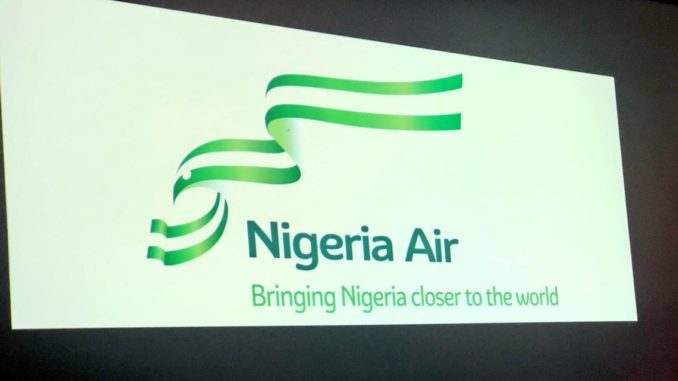
There should be no better location to make an announcement about the launch of a new airline venture than the Farnborough International Airshow, a weeklong biennial event in the United Kingdom that combines a trade exhibition for the aerospace and defence industries with an airshow.
It is the pre-eminent gathering of every major stakeholder in the global aviation industry.
Nigeria’s Minister of State for Aviation, Senator Hadi Sirika, did just that with the unveiling of Nigeria Air, the latest iteration of the nation’s quest for a national flag carrier through a press conference at the great gathering in UK.
In a statement issued by the Ministry of Aviation in Abuja after the London show, Sirika was quoted as saying, “I am very pleased to tell you that we are finally on track to launching a new national flag carrier for our country, Nigeria Air, an airline that we can all be proud of.
This will be a national carrier that will be private-sector led and driven.”
The highpoint of the story that gained traction was that the Federal Government would only own a maximum of 5% shareholding and that the venture would be private investor owned 95% and therefore private-sector driven as a nominal public-private partnership (PPP).
He went further to vow that there would be no government interference in the running of the airline and implicit in that disavowal was the elephant in the room – the abysmal history of previous attempts at a national flag carrier.
The evidence: West Africa Airways Corporation (BOAC); 1960-1971, Nigeria Airways ; 1971-2003, Air Nigeria (Capt. Joji) ; 1992-1993, International Finance Corporation (IFC) ‘New Co’ ; 1999-2001, Air Nigeria (Kema Chikwe) 2001-2002, Nigerian Global (Kema Chikwe); 2002-2003, Nigerian Eagle (Isa Yuguda); 2003-2004, Virgin Nigeria; 2005-2009, Air Nigeria; 2009-2010, Nigerian Eagle (Jimoh Ibrahim); 2011-2012 and Nigeria One; 2012-2013. Only four of these ventures actually became operational. They all eventually failed.
The arguments for a national flag carrier are indisputable and compelling.
What is more, despite the serial failures, there is no doubt that it remains an irresistible venture for the Federal Government.
A national flag carrier is a source of national pride and a symbol of development. We are blessed with a favourable geographic location to create a West African hub for aviation.
We have unutilised Bilateral Air Service Agreements (BASA) that represent a platform that will jump-start a flag carrier and there is even a certificate of compliance from the Infrastructure Concession Regulatory Commission (ICRC) in place.
With all these reasons and a private sector approach in place and the protective caveat of management and control remaining in the hands of the 95% private investors, there are grounds for cautious optimism.
However, all of our previous efforts at developing a flag carrier since the demise of Nigeria Airways have been launched with a nod to lessons learnt from previous failures and the latest venture is no different in incorporating lessons and signposting a roadmap that anticipates the pitfalls.
We are being promised a very robust corporate governance framework right from inception with strong guardrails to keep the venture firmly under private management and control – to be free from government interference or so it seems.
No sooner had the launch of the brand name and logo been concluded than concerns were raised by a broad spectrum of Nigerians.
These concerns are well founded as the Federal Government has a very poor track record of incubating and developing public-private partnerships (PPP).
The London press conference was curious in promoting a PPP robustly with the private element glaringly absent as it soon became apparent that no private investor faces were onboard at the venue.
Besides, the logo of a new airline that would be a source of national pride and ‘bring Nigeria closer to the world’ was actually designed by a branding and advertising company, From 6 Communications, based in the Kingdom of Bahrain.
Indeed the company was already touting on the day of launch their “most recent airline branding project” on its Facebook page.
What a shame that they neglected to advise their client to register the ‘Nigeria Air’ domain name and an enterprising Nigerian quickly acquired the name and demanded $66,000 to sell it to the venture.
It is becoming clear that the timing of this launch is constrained by the deadline of the elections next year and even clearer is a fact that the uncertainty of the outcome crystallizes an unacceptable level of political risk for a government backed venture attracting any serious private investors before the elections.
It is therefore not surprising that the Federal Government is solely responsible for the viability gap funding, which is a fanciful way of saying that they have to put up all the money till they can attract investors to come on board.
The initial capital required has ranged from $8 million to $300 million depending on if we go by the launch press conference or the numerous clarifications that have been required as questions are raised about how carefully thought out the process has been.
When it is necessary to make a series of clarifying statements it is safe to say that your ‘product launch’ has not been successful and the promoters need to go back to the drawing board.
Here we go again. We would like to wish the big dreamers a safe and successful venture.
In the main, we hope that a day will not come for us to be told that the gravitational forces arrayed against it have kept this laudable project as yet another mirage, after all.
It should be seen in the next few months as a glimmer and even audacity of hope. Whoever dashes this hope again will certainly be listed in the country’s Wall-of-Shame Archives.
END

Be the first to comment